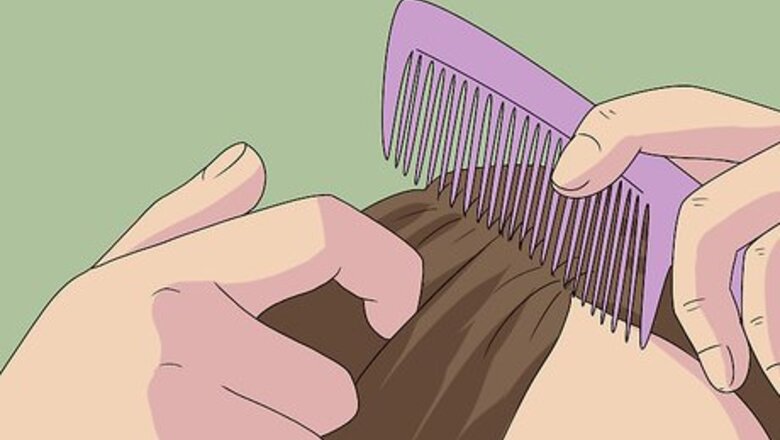
views
Creating the Dutch Braid
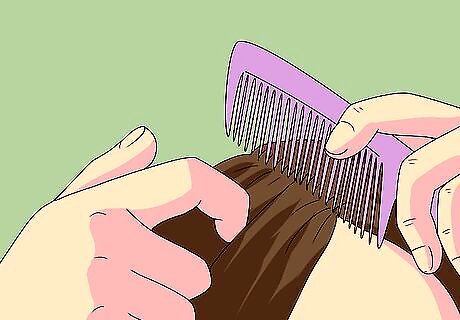
Comb your hair and part it down the middle. Make sure that your hair is free of all tangles and knots. It can be dry or slightly damp.
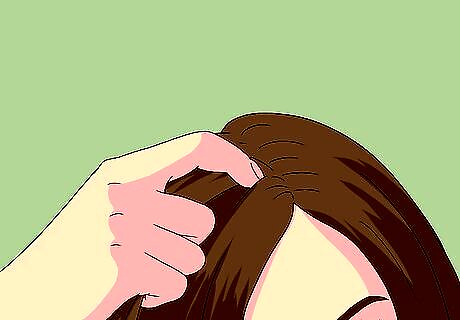
Take a small section of hair from the right side of the parting. Gather a small section of hair from along your forehead, starting from the parting. This first section of hair needs to be thick enough to divide into 3 strands, so approximately 2 cm (0.79 in) thick will work well. Run your fingers through this section of your hair to make sure that it is tangle-free. Choose the side of your head that is the most comfortable for you to start with. A general rule is that if you are right-handed it will be easiest to begin on the left side and vice versa if you are left-handed. However, try out starting the braid on each side first to see which feels more natural.
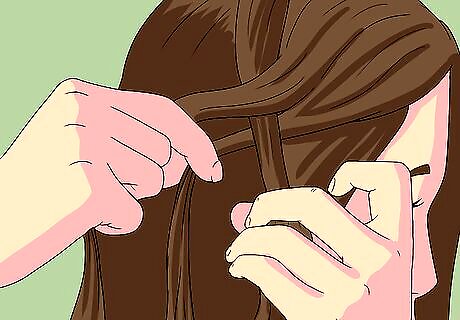
Begin plaiting your hair into a Dutch braid. Divide the section of hair into 3 equal parts. Cross the right strand of hair under the middle strand so that it becomes the new middle strand. Then cross the left strand under the middle strand to make the next, new middle strand. Use the end of a tail comb to divide your hair into clean sections. If you don't have a comb, feel free to use your pinky and pinky nail instead. Although it can seem complicated, a Dutch braid is actually very simple once you get enough practice with it. It is exactly the same as a French braid, except each section of hair is crossed under rather than over.
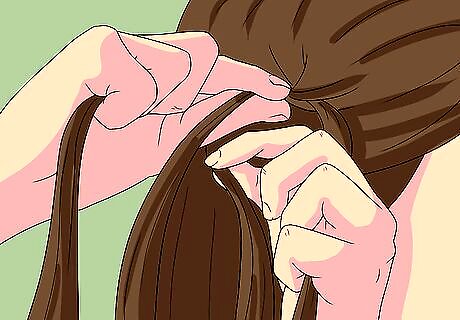
Add a small extra section of hair to each strand as you cross it under. After beginning the Dutch braid, pick up an extra section of hair from the same side as the strand and then gather it into the strand. Then cross the right strand under the middle as normal. Do the same action to the left strand of hair to create a Dutch French braid that wraps around your hairline. Make sure that you are working around your head and gathering hair from around your hairline, rather than working over your head and moving towards the top. The size of the extra sections of hair that you pick up depends on the thickness of your hair. Try adding a 1 cm (0.39 in) thick section each time as a starting point.
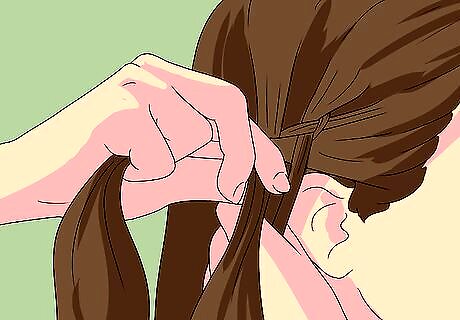
Continue Dutch braiding your hair around your hairline. Braid around your forehead, towards your ear, and then down to the nape of your neck. Aim towards the back of your head as you work. Continue gathering more hair into each section before you cross it below the middle strand. Make sure that your hair feels taut as you are braiding. This is because you can always loosen it once you’re done, but you cannot make it tighter.
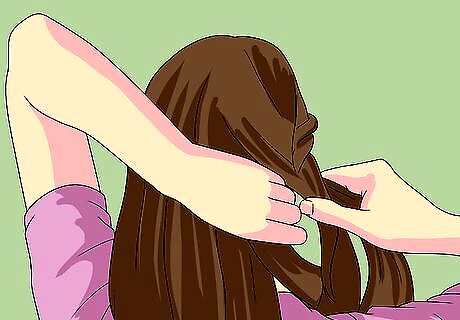
Bring your arm behind your head once the braid gets too awkward to hold. As you work around the nape of your neck, the braid will become difficult to hold and to continue braiding. If you started braiding on your right side, bring your right arm to the back of your head and if you started braiding on your left side, bring your left arm over your head and to the back. You can still hold the braid to keep it in place using 1 hand while you bring the other arm over your head. Changing the position of your hands is the most difficult part about doing a halo braid.
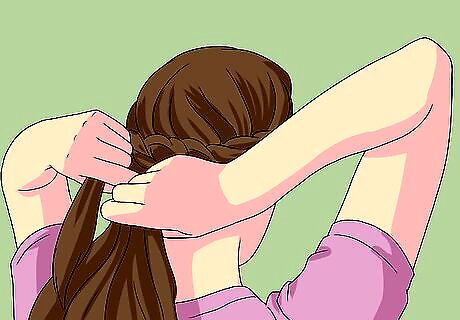
Continue braiding until the braid gets too difficult to hold again. Continue the process of gathering extra hair into the strand and crossing it under the middle. Eventually, around the left side on the nape of your neck, if you started braiding on the right, the braid will get too awkward to continue.
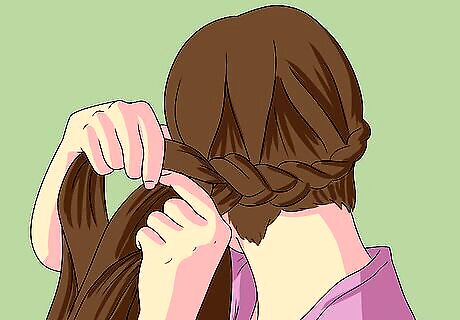
Bring your arm across your chest and braid up the left side of your head. Bring your right arm from the back of your head to the front of your body again. Position your arm so that it’s crossed over your chest as you continue the braid. Work your way up towards your ear and forehead using the same Dutch braiding process. Knowing which strand is which can get complicated when you change the position of your hands. However, saying aloud whether the right or left strand needs to be gathered or crossed next after you change position can help. Work as slowly as you like and don’t feel that you need to rush. A halo braid is a complicated hairstyle which does take a lot of practice. Keep in mind that you are now braiding upwards rather than down.
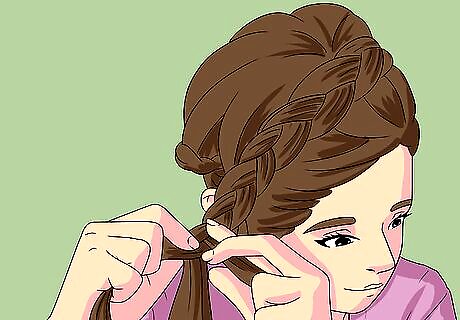
Braid your hair normally once you reach the start of the braid. As you approach your forehead again you will notice that you won’t be able to gather extra hair when you reach the beginning of the braid. Finish the braid by braiding normally. Cross each strand over the middle until you run out of hair. The end of your Dutch braid won’t be braided onto your head and will hang loosely to the side of your face.
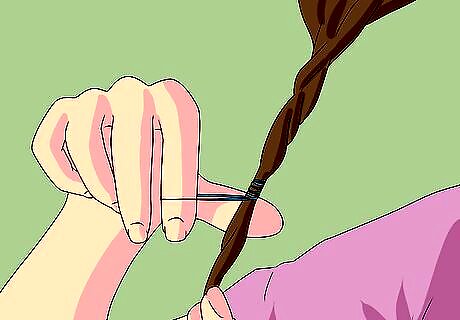
Secure the end of the braid with a hair tie. Once you cannot braid your hair any further, use a hair tie to hold the end together. Wrap it tightly so that you braid stays secure. Use a clear elastic hair tie if you have one, as this will be less noticeable if you braid loosens slightly once you have secured it.
Forming the Halo
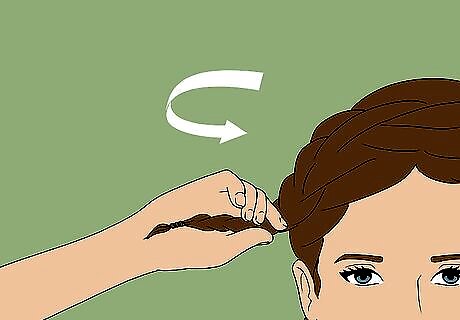
Wrap the end of the Dutch braid around your head to form a halo. Rest the end of the braid flat around your head, just above the section that has been braided into your hair. Make sure that the braid is resting firmly, but that it isn’t wrapped so tight that it feels uncomfortable. The braid will be wrapped in the same pattern of around your forehead, past your ear, and around towards the nape of your neck.
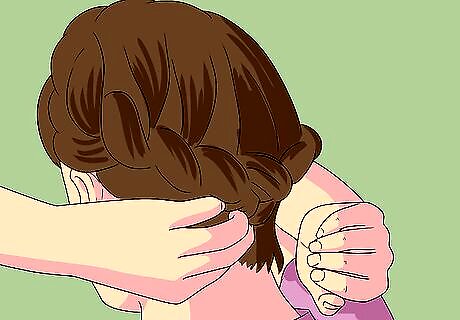
Tuck the end of the braid in at the nape of your neck. Gently push the part of the braid that is secured with a hair tie into the hair that is braided on the back of your head. Carefully place the end behind the strands of the braid so that the braid covers the hair tie. Be careful not to use too much pressure as this could damage the braid. Depending on the length of your hair, the end may not reach the nape of your neck or it may be longer and continue around the left side of your head. Tuck it in wherever it rests flat and feels comfortable.
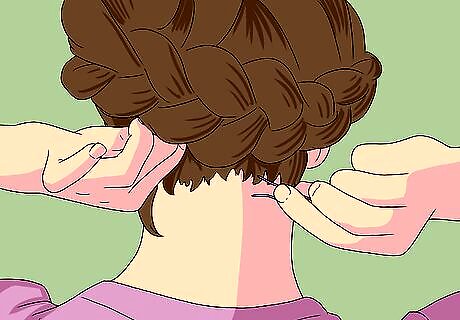
Use a bobby pin to secure the end of the braid to your hair. The hair tie will be hidden by the braid. Place the bobby pin so that it holds the end of the braid against your head. If 1 bobby pin doesn’t feel secure enough, use a few more until you feel confident that the end of the braid won’t come away from your head. Your braid will now look seamless, as it’s difficult to tell where it starts and ends.
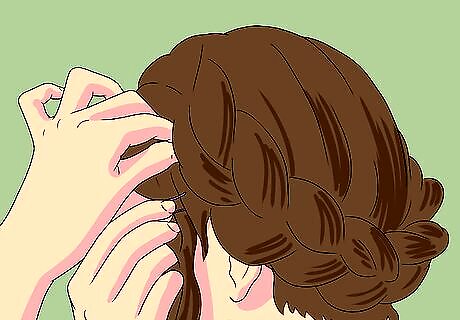
Hold down any untidy parts of the hairstyle using bobby pins. Some areas of the braid may not be pulled as tightly as others, or there may be noticeable loose hairs. Use bobby pins to pin these areas down so that they don’t stand out. Place the bobby pins horizontally as this helps them to be more hidden.
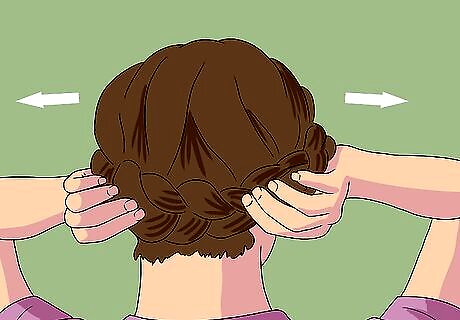
Pull out the whole braid very slightly to make it look more relaxed. Very gently pull each strand of the braid outwards slightly to make it wider and less taut. This will also make the hairstyle more comfortable for you as it won’t be pulled as tightly. Making the braid wider will not only hide any bobby pins, but it will also hide the spacing between the Dutch braid and the braid that has been wrapped around your head.
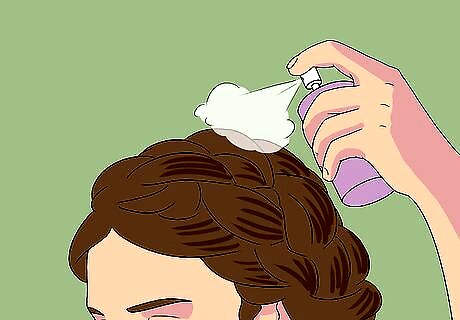
Spray your halo braid with hairspray to keep it secure for longer. Once you are happy with your halo braid, give it a light misting of hairspray to help it stay in place. You can also use the hairspray to hold down any stray hairs. The hairspray will also help to make your hair look smooth and to settle any frizz. It's okay if your braid looks a little messy, though!


















Comments
0 comment